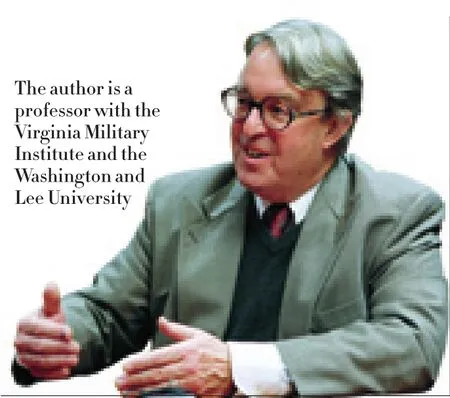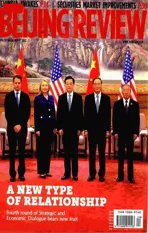BUILDING ON PAST SUCCESS
2012-10-14TheStrategicandEconomicDialoguecontinuestostrengthenSinorelationsByCliffordKiracofe
The Strategic and Economic Dialogue continues to strengthen Sino-U.S. relations By Clifford A. Kiracofe
COVER STORY
BUILDING ON PAST SUCCESS
The Strategic and Economic Dialogue continues to strengthen Sino-U.S. relations By Clifford A. Kiracofe
Positive U.S.-China relations are necessary for the constructive transformation of the present international system. The U.S.-China Strategic and Economic Dialogue (S&ED) process can play an important role, but domestic politics, or international politics, must not be allowed to derail the development of constructive and peaceful relations between Beijing and Washington.
Given world trends, it is clearly in the national interest of the United States to foster a positive, constructive, and stable relationship with China. A multi-polar world is emerging and Washington needs to respond appropriately in order to safeguard American national interests and to promote a peaceful and prosperous world order.
Transition to a multi-polar world
A 500-year period of Western imperialism and colonialism has ended. It is now time, in this new century, for the development of a peaceful and prosperous Pacific community within a transformed international system. This will no doubt be a long process, but a worthy vision for it needs to be set in place in our day.
The bi-polar Cold War international system ended in 1991, and since that time the world has been in a dif fi cult transition phase to a new multi-polar system. A successful transformation requires creative input from all concerned, particularly the major powers, so that all can feel comfortable with, and prosper within, a new modern and progressive international system.
The U.S.-China relationship is a critical factor in world politics today. Actions by powers outside the Pacific region, or inside it, which disrupt relations between Washington and Beijing must not be permitted. Washington must fi rmly rebuff and reject third-party actions which would derail this essential relationship.

Some may ask: Is Washington really ready to engage in a sincere effort with other major powers to effect such a transformation of the international system and to effect the development of a Pacific community? Will Washington sincerely engage Beijing on the basis of mutual bene fi t and mutual respect?
These are fair questions and they are questions Americans themselves should be asking about the intentions of the White House and Congress. The American people are no different from any others in their desire for peace and prosperity. The issue is the quality and competence of American leadership.
American leaders have not made it clear to the American people that a multi-polar world is emerging and that the United States must find its proper place and role in it.Instead, many leaders unrealistically cling to outdated Cold War perspectives and to foreign policy concepts based on hegemony.
As for the U.S.-China relationship,American leaders have failed to take a bipartisan stance and to support a pragmatic nonideological policy of long-term constructive engagement and cooperation. At election time, Democrats blame China for job losses at home while Republicans blame China for security threats. China is blamed by both parties for allegedly unfair trading practices, currency manipulation, and a raft of other matters.
Cooler heads with clearer vision are needed in Washington where powerful special interests meddle in U.S.-China policy and impair our long-range national interests.
One obstacle to a sensible U.S. policy is the persistence of outdated global perspectives in influential political and policy circles. In the United States there are different perspectives about the emerging international system and different policy prescriptions with respect to Washington’s role today and in the years to come. The dominant perspective still clings to an outdated Cold War perspective and even reaches back to the global crusade for democracy envisaged by President Woodrow Wilson(in of fi ce from 1913-21). Interventionism was part-and-parcel of Wilsonian policy, and there are those today who see this as a model.
Both political parties in the United States are, at present, influenced by factions who share such outdated perspectives and who advocate a policy of hegemony. Advocates for such a policy often cloak the underlying objective of strategic dominance, or primacy,in the phrase “leadership.” Intervention is said to be for “humanitarian” purposes.
In recent months, there have been a media blitz and exaggerated rhetoric about a socalled “return to the Paci fi c,” President Barack Obama as the “ fi rst Paci fi c president,” and an“American Pacific century.” But, as is well known, the United States has had a presence in the Asia Paci fi c since 1784 and the voyage of the U.S. trading shipEmpress of China.
Our fi rst “Paci fi c president,” under the republic, was Thomas Jefferson (in of fi ce from 1801-09). He dispatched the famous Lewis and Clark Expedition to scout the new Louisiana Purchase territory and to fi nd a way to the Paci fi c Ocean to lay the foundation for our future commerce in the Paci fi c region. President James K. Polk (in of fi ce from 1845-49) later fi rmly established our Paci fi c presence by the acquisition of California and the favorable settlement of the Oregon question.
In our time, President Richard M. Nixon(in office from 1969-74), who was born in California and who served in the Navy in the Paci fi c during World War II, boldly continued America’s traditional presence in the Paci fi c with the historic opening to China. The important contributions of President Jimmy Carter(in of fi ce from 1977-81) to the normalization process, and his continued positive interest in America’s relationship with China, must be applauded as well.
Unfortunately, today the positive attitude toward China of Presidents Nixon and Carter is challenged by those who advocate a policy of confrontation and of forward containment of China. Coercive diplomacy as well as political, psychological, and economic warfare are seen as appropriate tools for a policy of confrontation with China.
Rather than work toward a cooperative concert of great powers in a multi-polar world, there are those in Washington who advocate organizing and controlling a so-called“concert of democratic states” to confront socalled “authoritarian powers,” meaning China and Russia.
Rather than work toward a cooperative, harmonious, and prosperous Pacific community, there are those who advocate various mechanisms for the militarization and securitization of the Paci fi c aimed at hard containment of China.
Four decades and two wars on, it is high time for American leadership to come to its senses and devise a systematic, comprehensive, and integrated national strategy for our country to meet the challenges of the coming decades of transition and transformation of the international system.
Provocative actions by Washington on the Taiwan question can impede the development of relations and, unfortunately, special interests which seek to manipulate this issue in Congress and in the executive branch
What should be done?
A positive, constructive, and stable stateto-state relationship between China and the United States is one critical directionality which must be developed and maintained. To this end, the process of dialogue at all levels between China and the United States is fundamental.
Today, fortunately for the Chinese and American people, both sides are developing this dialogue at various levels as the recent U.S.-China S&ED underscores.
This fall, China will have a once-in-a-decade leadership change and thus continuity in policy can be maintained when desired. The United States, however, will have presidential elections in 2012, 2016, and 2020. Special interests and other domestic factors can and do impact negatively on policy formation and policy continuity.
The economic dimension of the U.S.-China relationship is of vital importance to both sides. Washington often calls on foreign capitals to act “responsibly.” But does Washington act responsibly when it comes to fi nancial matters?
The global international financial crisis which erupted in 2008 was triggered by the toxic mortgage loan catastrophe which began in California. This fi nancial crisis continues today where Europe, in particular, is in dire straits.
Washington has yet to seriously address the severe problems in the U.S. fi nancial system. In large part, the problems stem from the move in Congress in the late 1990s to deregulate banking by repealing the Depression-era Glass-Steagall Act. The old legislation from 1933 separated commercial bank operations from speculative investment bank operations,thus promoting a sound banking system.
By repealing this legislation which protected the public interest in a sound banking system,the speculators and casino capitalists of Wall Street were able to wreak havoc at home and globally. Clearly, Washington needs to reinstate the Glass-Steagall Act in its entirety to be credible internationally and to protect the American people from further fi nancial instability and possibly severe in fl ation.
It is certainly no wonder that, in recent years, confidence in Asia has been shaken with respect to Washington’s leadership in the international fi nancial area.
Under such circumstances, it is logical that Asia-Paci fi c nations now wish to protect their national capital markets and financial systems from various storms, contagions, and all the rest that goes with unregulated speculative activities of the casino capitalists of Wall Street, London, and other fi nancial capitals.
Building a peaceful and prosperous Pacific community can benefit other regions of the world. The Paci fi c community has its role as the world’s primary zone of stability and economic growth. Protecting the economic interests of all stakeholders in the Paci fi c region will contribute to the development of a harmonious, con fi dent,and vibrant community.
As to strategic matters in the Pacific region, unnecessary and inappropriate militarization and securitization must be avoided.Effective measures must be put into place to prevent conflict and unnecessary wars.Provocative actions and policies are counterproductive.
Washington, for its part, must avoid further provocation with regard to the Taiwan question,an internal Chinese matter which some wish to use to derail U.S.-China relations.
It is high time that Washington revise legislation and policies on this issue. Sticking to the spirit and letter of the three communiqués is a good starting point, but legislation must be updated to re fl ect current realities and national interests. Pandering to the Taiwan lobby, among others, is counterproductive.
There is no reason that South China Sea matters cannot be solved through diplomacy.Militarization of the issue can be counterproductive. Washington needs to refrain from provocative actions while at the same time retaining its position that this area be an open sea, not a “mare clausum,” through which maritime traffic has a peaceful right of passage under international law.
Direct dialogue between the Chinese military and the U.S. military is essential to developing a constructive overall state-tostate relationship. From direct dialogue and exchange of views can come ideas and proposals for mutually bene fi cial joint activities.Provocative actions by Washington on the Taiwan issue, in particular, can impede the development of relations and, unfortunately,special interests which seek to manipulate this issue in Congress and in the executive branch.
The U.S.-China S&ED is a key element in state-to-state relations, and it is to be hoped that additional dialogue develops at the people-to-people level. A worthy vision of a Paci fi c community within a transformed international system must be created by all those concerned with the peace, harmony, and prosperity of the region.
杂志排行
Beijing Review的其它文章
- Mass Producing Charity A venture capital investor uses his business savvy to maximize the impact of his philanthropic work
- The Art of Staying Relevant After thousands of years, Sun Tzu’s military treatise is still used and embraced by readers and leaders alike
- Making a Better Capital Market A series of new measures aim to ensure fairness, maintain sound development and protect investors’ interests
- Dealing With Loneliness Suicidal tragedies bring to light the plight of left-behind women in China By Wang Hairong
- Special Treatment
- THIS WEEK
